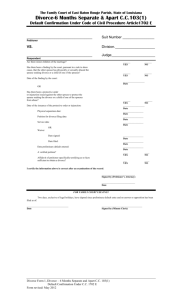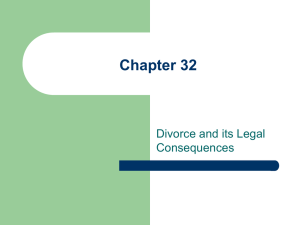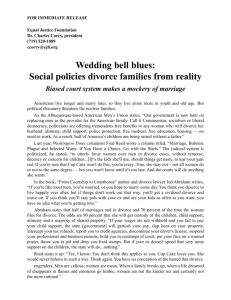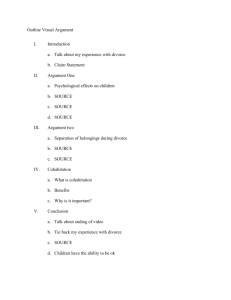Using Legal Language
advertisement
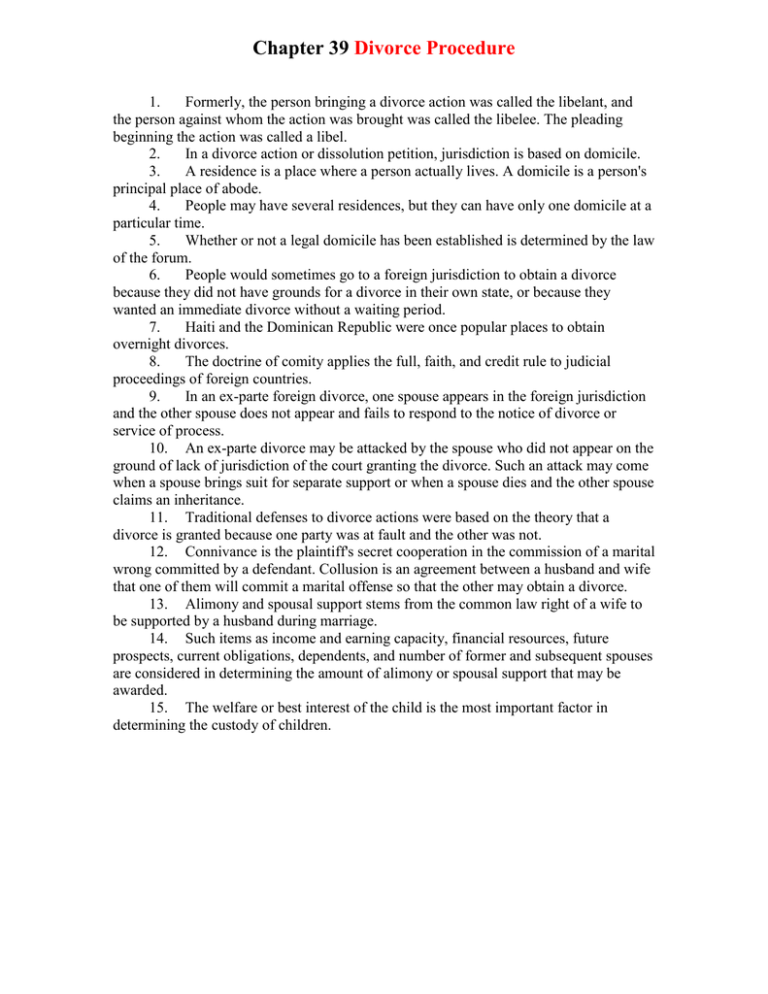
Chapter 39 Divorce Procedure 1. Formerly, the person bringing a divorce action was called the libelant, and the person against whom the action was brought was called the libelee. The pleading beginning the action was called a libel. 2. In a divorce action or dissolution petition, jurisdiction is based on domicile. 3. A residence is a place where a person actually lives. A domicile is a person's principal place of abode. 4. People may have several residences, but they can have only one domicile at a particular time. 5. Whether or not a legal domicile has been established is determined by the law of the forum. 6. People would sometimes go to a foreign jurisdiction to obtain a divorce because they did not have grounds for a divorce in their own state, or because they wanted an immediate divorce without a waiting period. 7. Haiti and the Dominican Republic were once popular places to obtain overnight divorces. 8. The doctrine of comity applies the full, faith, and credit rule to judicial proceedings of foreign countries. 9. In an ex-parte foreign divorce, one spouse appears in the foreign jurisdiction and the other spouse does not appear and fails to respond to the notice of divorce or service of process. 10. An ex-parte divorce may be attacked by the spouse who did not appear on the ground of lack of jurisdiction of the court granting the divorce. Such an attack may come when a spouse brings suit for separate support or when a spouse dies and the other spouse claims an inheritance. 11. Traditional defenses to divorce actions were based on the theory that a divorce is granted because one party was at fault and the other was not. 12. Connivance is the plaintiff's secret cooperation in the commission of a marital wrong committed by a defendant. Collusion is an agreement between a husband and wife that one of them will commit a marital offense so that the other may obtain a divorce. 13. Alimony and spousal support stems from the common law right of a wife to be supported by a husband during marriage. 14. Such items as income and earning capacity, financial resources, future prospects, current obligations, dependents, and number of former and subsequent spouses are considered in determining the amount of alimony or spousal support that may be awarded. 15. The welfare or best interest of the child is the most important factor in determining the custody of children. Understanding Legal Concepts 1. 2. 3. 4. 5. F, libelant F, domicile T T T 6. 7. 8. 9. 10. T F, recrimination T F, does not exist F, are Checking Terminology 1. 2. 3. 4. 5. 6. w l q b v r 7. 8. 9. 10. 11. 12. c n g e a, hh x 13. 14. 15. 16. 17. 18. j u, s ee p f h 19. 20. 21. 22. 23. 24. dd z cc aa bb ff 25. 26. 27. 28. 29. 30. gg 31. m 32. d, y i k o t ii Using Legal Language Some years ago, before no-fault divorce was readily available, Rodney brought a divorce action against Heather on the ground of adultery. He was the libelant, she was the libelee, and the initial pleading was called a(n) libel. The forum—that is, the place of litigation—where Rodney brought the action was located in his principal place of abode, known as his domicile. Because it was the place where he actually lived, it was also his residence. Before the action, Heather had agreed with Rodney to commit adultery so that he could divorce her, setting up the defense of collusion if Heather wanted to use it. In addition, Rodney secretly arranged to have his friend, Rudolph, spend the weekend with Heather while he was out of town, making available to her the defense of connivance. In addition, Rodney deserted Heather, leaving her without means for support. Because this conduct was on the part of the plaintiff, which constituted a ground for divorce, it was also a defense called recrimination. Before the case went to trial, the parties forgave each other for their indiscretions, and the two resumed cohabitation, which created the defense of condonation. Their reunion did not work out, however, and Heather decided to go to Haiti, a(n) foreign jurisdiction, to obtain an overnight divorce. Rodney refused to voluntarily submit to that court's jurisdiction by filing a(n) appearance, which meant that this was a(n) ex-parte foreign divorce action rather than a(n) bilateral foreign divorce action. As a result, the doctrine of comity, stating that the courts of one jurisdiction will give effect to the laws and judicial decisions of another jurisdiction, did not apply. Heather did not ask for alimony—that is, an allowance for support and maintenance—as part of the court's decree (decision). Puzzling Over What You Learned 1 2 F O 3 R E 4 I G N 5 J U 6 R O E N U E R S T D S U I E G M D R M I S D I C T I O N O 7 M 8 P L 9 P E T I T I O N E O C B T N I E I S L L T E E R E E L N N O C C E U T T E I E O N N 10 O L 11 I B E L A N T L I S R 12 C O M I T P I Y P E 13 D A M O N Y 14 P R O C E E D I N G R C A 15 R E S P O E N D E N T C 16 D E C R E E E Caveat: Allow squares for spaces between words and punctuation (apostrophes, hyphens, etc.) when filling in crossword. Across 1. Another state or country. 9. One who presents a petition to a court. 10. The plaintiff in a divorce action. 12. Courts of one jurisdiction will give effect to the laws of another. 13. Allowance made to a divorced spouse by a former spouse for support. 14. The procedure in California for obtaining a dissolution of marriage. 15. One who is called on to answer a petition. 16. A decision of a court of equity. Down 1. 2. 3. 4. 5. 6. 7. 8. 11. The place of litigation. Place where a person actually lives. Provisional or temporary decision of a court. A provisional judgment. Written answer to a petition filed by a respondent. Principal place of abode. The defendant in a divorce action. A written application for a court order. Voluntary submission to the court's jurisdiction.
